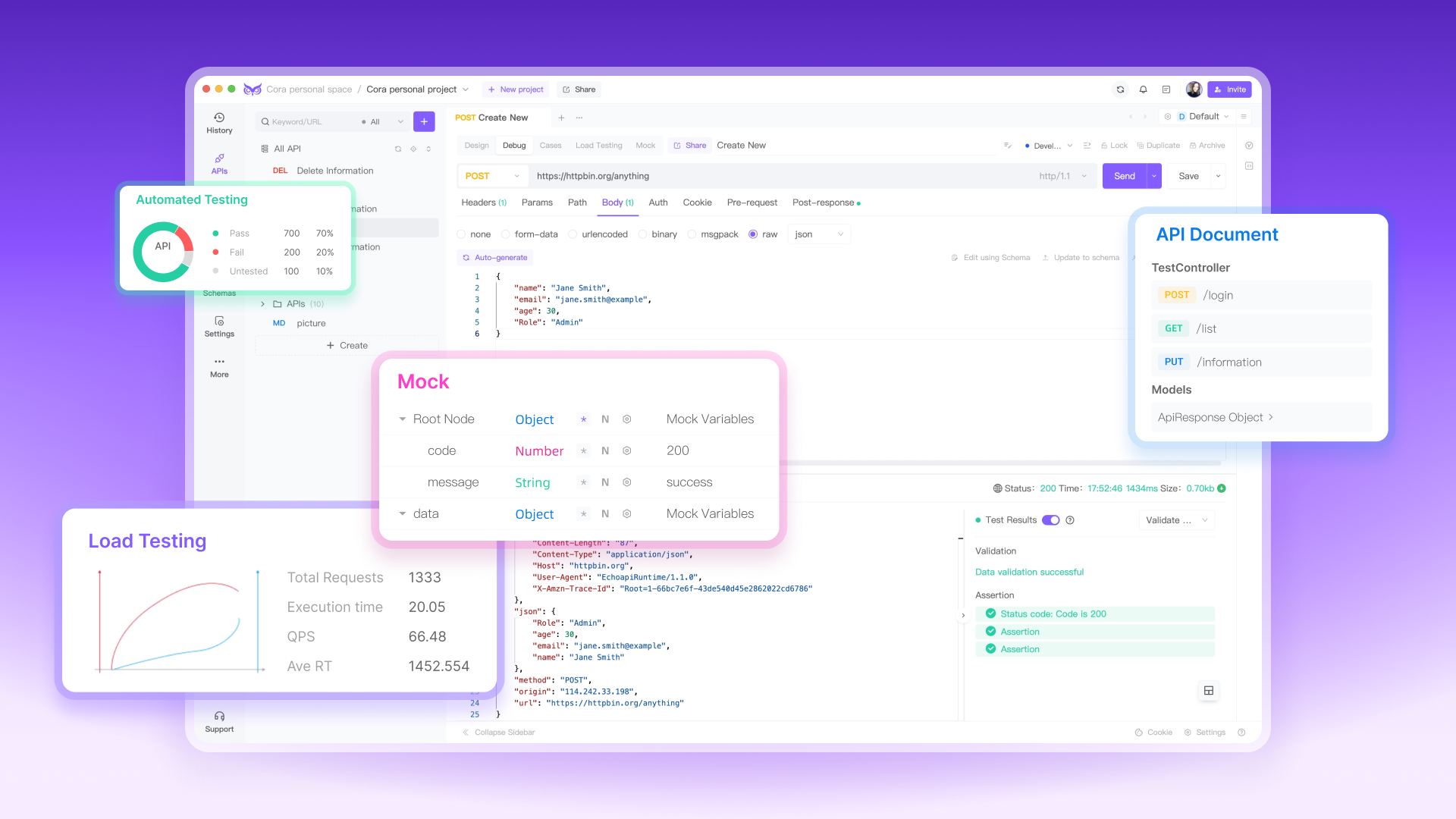Best Practices: How to Make Your API Smarter and More Flexible
 Bobo
BoboWhen you build an API, you want it to do more than just handle one type of request. You want it to be flexible— able to adapt to different needs and situations. Imagine an API as a waiter at a restaurant. A flexible waiter doesn’t just take one type of order; they can handle requests from many customers with different preferences and needs. The same applies to your API!

So, how can we make our APIs smarter and more flexible? Let’s dive into some simple strategies to make your API more adaptable and powerful.
Support Multiple Request Methods (GET, POST, PUT, DELETE)
A flexible API should support various HTTP methods, not just one. Think of HTTP methods as verbs that describe what you want to do with the data:
GET: Retrieve information.
POST: Send or create new data.
PUT: Update existing data.
DELETE: Remove data.
For example, if you’re building an API for managing books, you could use:
GET /books to retrieve a list of books.
POST /books to add a new book.
PUT /books/1 to update a specific book.
DELETE /books/1 to delete a book.
Example in Flask:
from flask import Flask, request, jsonify
app = Flask(__name__)
books = [{"id": 1, "title": "The Great Gatsby"}, {"id": 2, "title": "1984"}]
# GET: Retrieve all books
@app.route('/books', methods=['GET'])
def get_books():
return jsonify(books)
# POST: Add a new book
@app.route('/books', methods=['POST'])
def add_book():
new_book = request.json
books.append(new_book)
return jsonify(new_book), 201
# PUT: Update a book by ID
@app.route('/books/<int:book_id>', methods=['PUT'])
def update_book(book_id):
updated_book = request.json
for book in books:
if book['id'] == book_id:
book.update(updated_book)
return jsonify(book)
return jsonify({"error": "Book not found"}), 404
# DELETE: Remove a book by ID
@app.route('/books/<int:book_id>', methods=['DELETE'])
def delete_book(book_id):
global books
books = [book for book in books if book['id'] != book_id]
return jsonify({"message": "Book deleted"})
if __name__ == '__main__':
app.run(debug=True)
By supporting multiple request methods, your API can handle creating, updating, and deleting data in addition to retrieving it. This makes your API more flexible for different use cases.
Use URL Parameters and Query Strings
You can make your API more powerful by using URL parameters and query strings to allow users to customize their requests.
URL parameters: Use these when you want to target a specific item, like /books/1 to get the book with ID 1.
Query strings: Use these to filter or modify data. For example, /books?author=Orwell could return books by the author Orwell.
Example:
#GET books by query string
@app.route('/books', methods=['GET'])
def get_books():
author = request.args.get('author')
if author:
return jsonify([book for book in books if book.get('author') == author])
return jsonify(books)
Now, if someone makes a request to /books?author=Orwell, they’ll get all books written by Orwell. This adds a layer of flexibility, allowing users to filter the data they need without building separate endpoints.
Paginate Large Results
Imagine you have an API with hundreds or thousands of results. Returning everything at once can overload the server or be slow for the user. Pagination allows you to break large data sets into smaller, manageable chunks.
For example, instead of returning 1,000 books in a single response, you return 10 books per page.
@app.route('/books', methods=['GET'])
def get_books():
page = int(request.args.get('page', 1))
per_page = int(request.args.get('per_page', 10))
start = (page - 1) * per_page
end = start + per_page
return jsonify(books[start:end])
Now, by calling /books?page=1&per_page=10, users get the first 10 books, and they can navigate through pages of data. This reduces the load on your server and speeds up responses.
Handle Different Data Formats (JSON, XML, etc.)
Most APIs send and receive data in JSON format (because it’s easy to use), but some systems may require other formats like XML. A flexible API should be able to handle different formats based on what the user needs.
Here’s how you can support both JSON and XML in Flask:
from flask import jsonify, request
import xml.etree.ElementTree as ET
def to_xml(data):
root = ET.Element('books')
for item in data:
book = ET.SubElement(root, 'book')
for key, value in item.items():
ET.SubElement(book, key).text = str(value)
return ET.tostring(root)
@app.route('/books', methods=['GET'])
def get_books():
data = books
if request.headers.get('Accept') == 'application/xml':
return to_xml(data), 200, {'Content-Type': 'application/xml'}
return jsonify(data)
If the user requests XML data by setting the Accept header to application/xml, your API will return XML. Otherwise, it defaults to JSON. Supporting multiple formats makes your API more adaptable to different client requirements.
Allow Optional and Customizable Fields
Sometimes, users don’t need all the information your API provides. Allowing them to customize which fields they want in the response can make the API more efficient and user-friendly.
For example, instead of sending all book details, you could allow the user to select only the title and author fields.
@app.route('/books', methods=['GET'])
def get_books():
fields = request.args.get('fields')
if fields:
fields = fields.split(',')
result = [{field: book[field] for field in fields if field in book} for book in books]
return jsonify(result)
return jsonify(books)
Now, if the user requests /books?fields=title,author, they’ll get just the titles and authors, making responses smaller and faster. This flexibility is especially useful when working with large data sets.
Version Your API
As your API evolves, you might add new features or make changes that could break old applications using it. To avoid this, you can version your API, meaning you keep the old versions around for compatibility while developing new ones.
@app.route('/v1/books', methods=['GET'])
def get_books_v1():
return jsonify(books)
@app.route('/v2/books', methods=['GET'])
def get_books_v2():
# New version with different data or structure
return jsonify([{"id": book['id'], "name": book['title']} for book in books])
Now, users can choose which version to use. Version 1 (/v1/books)returns the original data, while version 2 (/v2/books) might introduce changes without breaking the old functionality.
The Next Step
Making your API flexible means thinking about how different users, apps, or systems will interact with it. By supporting multiple request methods, using parameters and query strings, implementing pagination, handling different data formats, allowing customizable fields, and versioning your API, you can make your API more adaptable and future-proof.
Building a flexible API not only improves performance but also makes it easier for developers and systems to integrate with your service, making it a win-win for everyone!

Now that you understand the key elements of building a flexible API, the next step is ensuring that your API is not only adaptable but also well-tested and reliable. This is where a powerful tool like EchoAPIcomes into play. EchoAPI simplifies the process of debugging, testing, and documenting APIs, making it easier to ensure your API functions flawlessly across different use cases.
EchoAPI is a comprehensive API development tool that covers API Debugging, API Design, Load Testing, Documentation, and Mock Servers. You can start testing quickly without needing to create an account or sign in. It includes a Built-in Scratch Pad for notes, offers an affordable price for developers and teams, and has a lightweight native client that runs smoothly without slowing down your system. These features make EchoAPI a versatile, accessible, and cost-effective tool for API testing.
By using EchoAPI, you can thoroughly test your newly created API, simulate various request conditions, and ensure your application responds correctly before it goes live.
Try EchoAPI Interceptor today! https://www.echoapi.com/plugin/chrome?utm_source=6715d073
Subscribe to my newsletter
Read articles from Bobo directly inside your inbox. Subscribe to the newsletter, and don't miss out.
Written by
